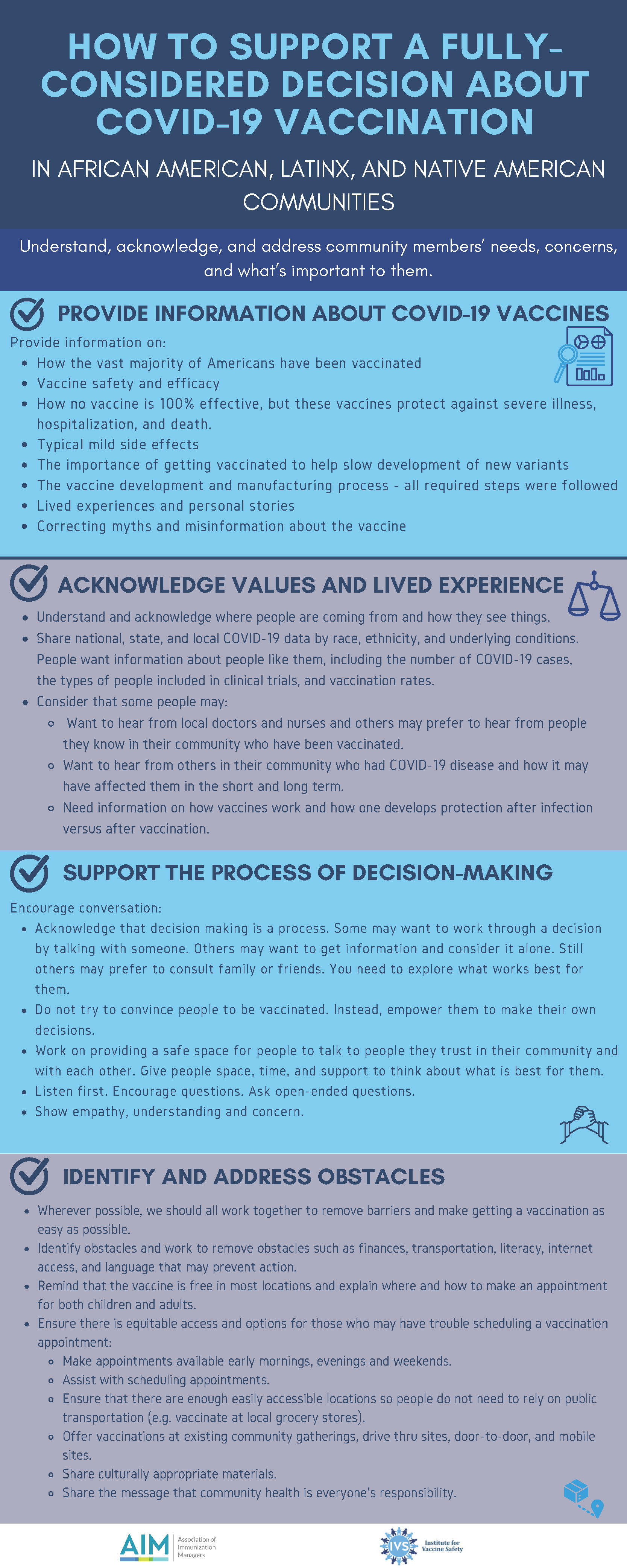How to Support Vaccination Decisions in African American, Latinx, and Native American Communities
Understand, acknowledge, and address community members’ needs, concerns, and what’s important to them.
Provide Information About COVID-19 Vaccines
- How the vast majority of Americans have been vaccinated.
- Vaccine safety and efficacy.
- How no vaccine is 100% effective, but these vaccines protect against severe illness, hospitalization, and death.
- Typical mild side effects.
- The importance of getting vaccinated to help slow development of new variants.
- The vaccine development and manufacturing process – all required steps were followed.
- Lived experiences and personal stories.
- Correcting myths and misinformation about the vaccine.
Acknowledge Values and Lived Experience
- Understand and acknowledge where people are coming from and how they see things.
- Share national, state, and local COVID-19 data by race, ethnicity, and underlying conditions.
- People want information about people like them, including the number of COVID-19 cases, the types of people included in clinical trials, and vaccination rates.
- Consider that some people may:
- Want to hear from local doctors and nurses and others may prefer to hear from people they know in their community who have been vaccinated.
- Want to hear from others in their community who had COVID-19 disease and how it
may have affected them in the short and long term. - Need information on how vaccines work and how one develops protection after infection versus after vaccination.
Support the Process of Decision-Making
- Acknowledge that decision-making is a process. Some may want to work through a decision by talking with someone. Others may want to get information and consider it alone. Still others may prefer to consult family or friends. You need to explore what works best for them.
- Do not try to convince people to be vaccinated. Instead, empower them to make their own decisions.
- Work on providing a safe space for people to talk to people they trust in their community and with each other. Give people space, time, and support to think about what is best for them.
- Listen first. Encourage questions. Ask open-ended questions.
- Show empathy, understanding and concern.
Identify and Address Obstacles
- Wherever possible, we should all work together to remove barriers and make getting a
vaccination as easy as possible. - Identify obstacles and work to remove obstacles such as finances, transportation, literacy,
internet access, and language that may prevent action. - Remind that the vaccine is free in most locations and explain where and how to make an
appointment for both children and adults. - Ensure there is equitable access and options for those who may have trouble scheduling a
vaccination appointment:- Make appointments available early mornings, evenings and weekends.
- Assist with scheduling appointments.
- Ensure that there are enough easily accessible locations so people do not need to rely
on public transportation (e.g. vaccinate at local grocery stores). - Offer vaccinations at existing community gatherings, drive thru sites, door-to-door, and mobile sites.
- Share culturally appropriate materials.
- Share the message that community health is everyone’s responsibility.
This project is focused on how public health and other stakeholders can best understand and support decision-making as individuals consider if, and under what conditions, COVID-19 vaccination is right for them. Participants in these conversations were African Americans, Latinx, and Native Americans recruited from local communities or panel survey respondents from four U.S. regions (Northeast, Midwest, South, West) who had indicated that they were undecided about their intent to vaccinate now or in the future against COVID-19. This project is funded by Robert Wood Johnson Foundation and is a collaboration of AIM, NACCHO, Johns Hopkins, and other partners.

